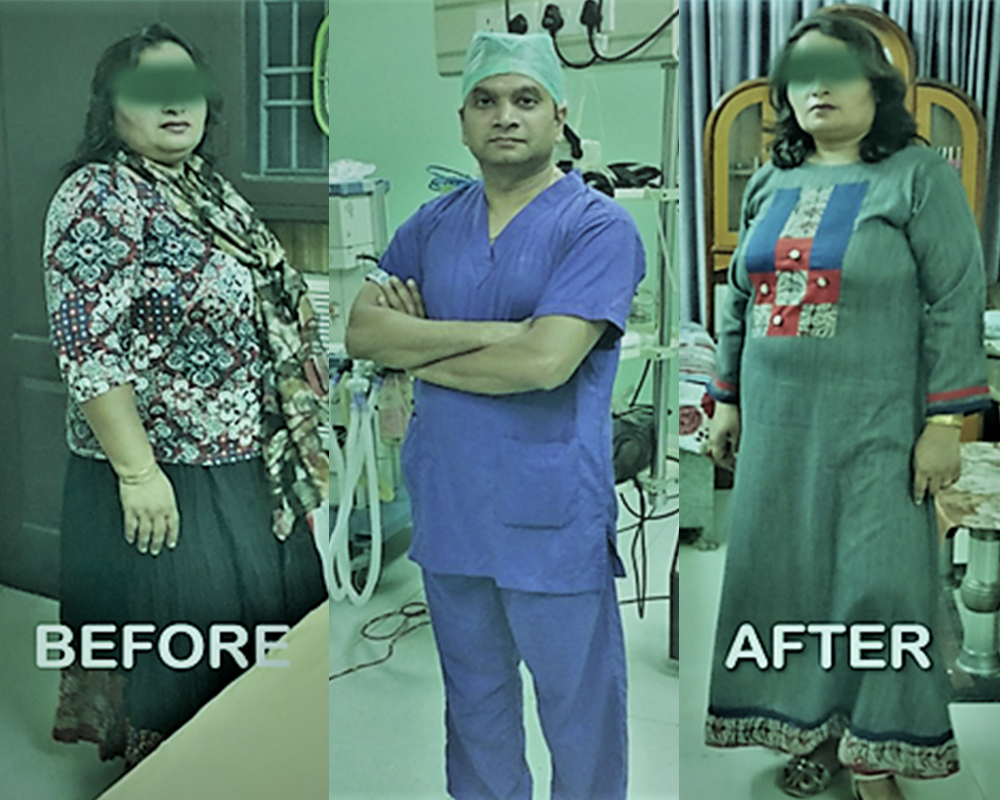What Bariatric Surgeon Says About Weight Loss Surgery
According to Bariatric Surgeon it is a type of weight loss surgery which works by altering anatomy of gastrointestinal tract and the gastrointestinal physiology. There are certain criteria for surgery. It is done laparoscopically by Bariatric Surgeon with small cuts on abdomen, the advantage being less post-op pain, early mobility and early discharge. Patient has to follow certain dietary habits after surgery. Weight loss is gradual, the patient losses over 80% excess weight over 6-8 months. Diabetes & Hypertension resolve in most cases independent of weight loss thats why it is also called as Metabolic Surgery. Literature support its safety. In last it should be remembered that Bariatric surgery is not a substitute for a healthy diet and regular exercise. It help in reducing weight but you have to maintain it.
Obesity is a modern epidemic disease, most important cause of morbidity in current clinical scenario. More of sedentary life style and junk food are the root cause. Bariatric Surgery is an option to put a full stop to this epidemic.
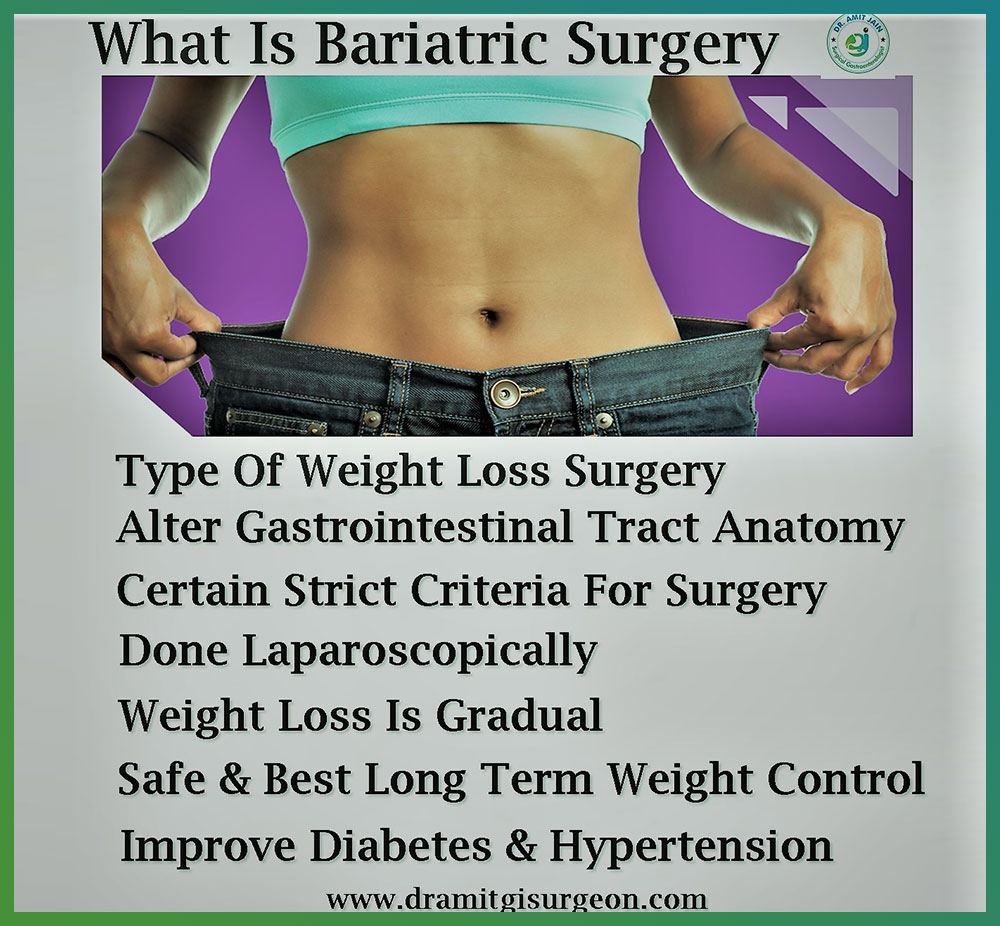
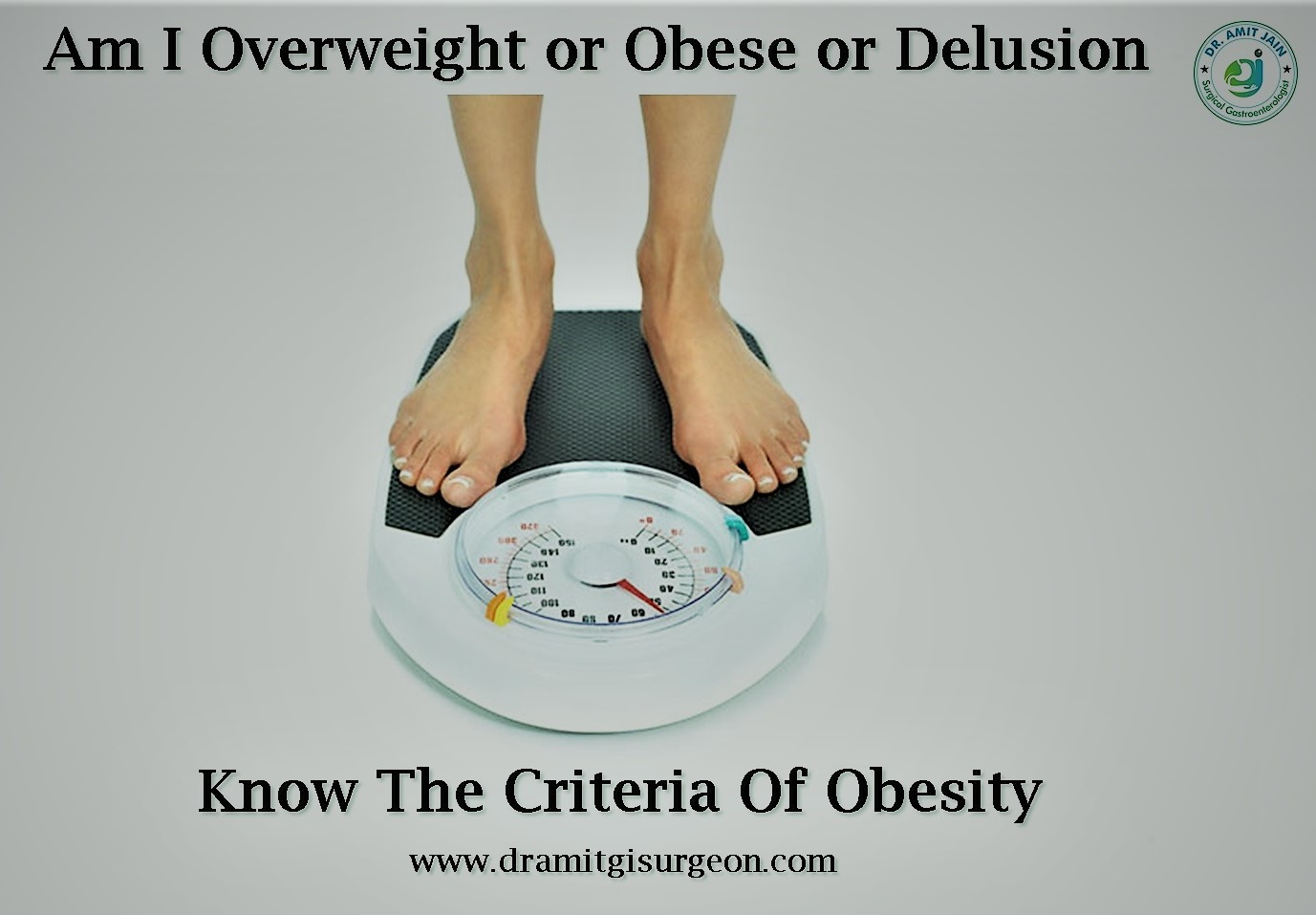
What Is Obesity and Its Criteria
Excessive or Abnormal Fat accumulation in our body which hamper our health & body function is called as overweight & obesity
Body mass index (BMI) is defined as a person’s weight in kilograms divided by the square of his height in meters (kg/m2). It is simple index of weight-for-height and is used to classify overweight and obesity in adults
The Prevalence of obesity has nearly doubled in the last decade and has increased to such an extent that in present scenario, nearly a third of the world’s population is overweight or obese. The incidence has increased irrespective of socioeconomic status, ethnicity and geographical locality.
What Causes Obesity & Overweight
Obesity is the result of energy imbalance between calories utilized and calories consumed. It is due to consumption of energy dense foods that are high in fat and sugars and conversely physically inactivity due to sedentary life-style
Behaviors: We all know we should follow a healthy diet and regular physical activity. A healthy diet includelots of fruits &vegetables, whole grains and lean proteins and a limited intake of high-fat foods. We should engage in 150 minutes of moderate exercise and/or 75 minutes of intense exercise, as well as strength building exercises. Failing to adhere to these guidelines by eating an unhealthy diet and not exercising enough, increases the risk of overweight, obesity
Depression can sometimes lead to weight gain, as people turn to food for emotional comfort.

Genetics: Genetic factors do influence how people respond to a high calorie intake or changes in the environment. Gene variants have also been identified that increase hunger and the amount of food people eat.
Disease: Certain Known diseases such as Cushing’s disease, Hypothyroidism &polycystic ovary syndrome can lead to obesity
Medications: Certain medications such as antidepressants and steroids can lead to weight gain.
Environment and community: Your environment at home, at school, and in your community, can all influence how and what you eat and how active you are. Maybe you haven’t learned to cook healthy meals or don’t think you can afford healthier foods. If your neighborhood is unsafe, maybe you haven’t found a good place to play, walk, or run.

How To Treat Obesity
Lifestyle and behavior changes
Your healthcare team can educate you on better food choices and help develop a healthy eating plan that works for you. A structured exercise program and increased daily activity — up to 300 minutes a week — will help build up your strength, endurance, and metabolism.
Counseling or support groups may also identify unhealthy triggers and help you cope with any anxiety, depression, or emotional eating issues.
Medical weight loss
Your doctor may also prescribe certain prescription weight loss medications in addition to healthy eating and exercise plans. Medications are usually prescribed only if other methods of weight loss haven’t worked and if you have a BMI of 27 or more in addition to obesity-related health issues.
Prescription weight loss medications either prevent the absorption of fat or suppress appetite. These drugs can have unpleasant side effects. For example, the drug orlistat (Xenical) can lead to oily and frequent bowel movements, bowel urgency, and gas. Your doctor will monitor you closely while you’re taking these medications.
Why Bariatric Surgeon Stress Weight Management
Complications Of Obesity
Obesity represents a major health challenge that cause premature disability and death by increasing the risk for type 2 diabetes mellitus, fatty liver disease, hypertension, myocardial infarction, stroke, dementia, osteoarthritis, obstructive sleep apnoea and several cancers.
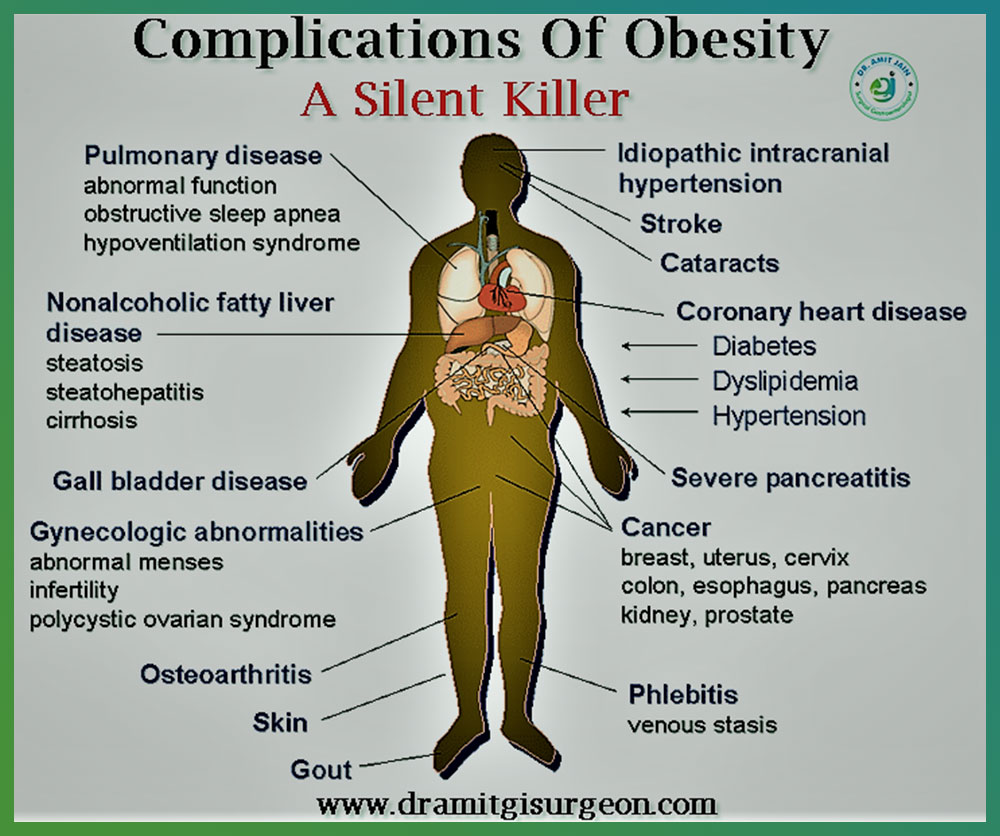

Indications For Bariatric Surgery
BMI >37.5 without presence of any obesity related co-morbidities or
BMI > 32.5 with the presence of type 2 Diabetes / any obesity related co-morbidities
Patients motivated to lose weight and commitment to long term follow up
Patient should have attempted conservative methods of weight loss and failed
Bariatric surgery to be considered only between ages of 18 – 65 years
It may be considered in patients more than 65 years in the presence of severe obesity related co-morbidities / disability
It may be considered in patients< 18 years in special situations after pediatrician / endocrinology certification , but after attainment of puberty or completion of skeletal maturity
Contraindications
The absolute contra-indications for bariatric surgery include Drug or Alcohol abuse , Uncontrolled Psychological Disease and Pregnancy

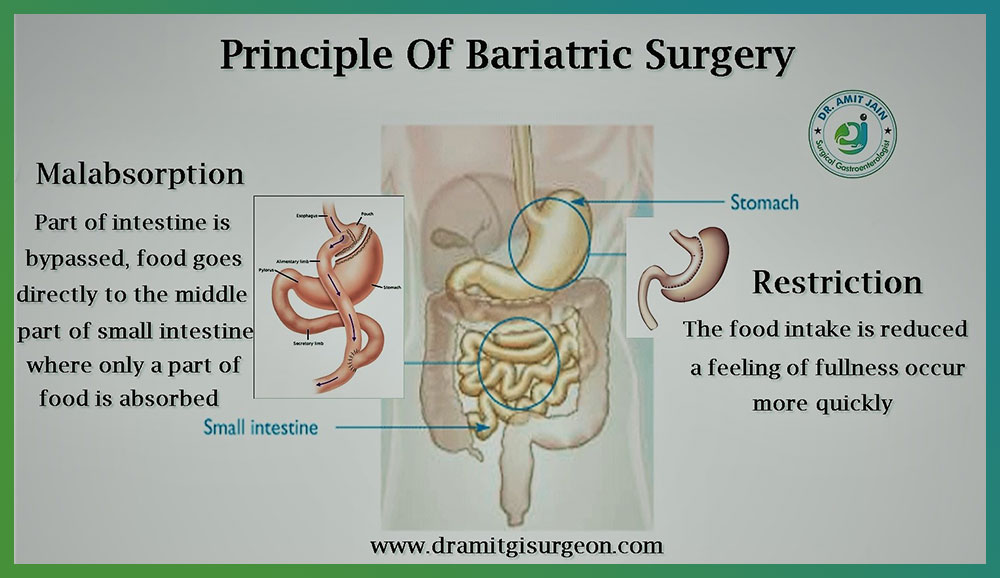
Principle of Bariatric Surgery
The basic principle of bariatric surgery is to restrict food intake and decrease the absorption of food in the stomach and intestines.
Restriction : Surgery is used to physically limit the amount of food the stomach can hold, which limits the number of calories you can eat.
Malabsorption: Surgery is used to shorten or bypass part of the small intestine, which reduces the amount of calories and nutrients the body absorbs.
Types of Bariatric Surgery Performed By Bariatric Surgeon
Sleeve gastrectomy: In this surgery part of the stomach is separated and removed from the body. The remaining section of the stomach is formed into a tube like structure. This smaller stomach cannot hold as much food. It also produces less of the appetite-regulating hormone ghrelin, which may lessen your desire to eat. However, sleeve gastrectomy does not affect the absorption of calories and nutrients in the intestines.
Roux-en-Y gastric bypass: A small pouch at the top of the stomach is created. The pouch is the only part of the stomach that receives food. This greatly limits the amount that you can comfortably eat and drink at one time.
The small intestine is then cut a short distance below the main stomach and connected to the new pouch. Food flows directly from the pouch into this part of the intestine. The main part of the stomach, however, continues to make digestive juices. The portion of the intestine still attached to the main stomach is reattached farther down. This allows the digestive juices to flow to the small intestine.
Because food now bypasses a portion of the small intestine, fewer nutrients and calories are absorbed.
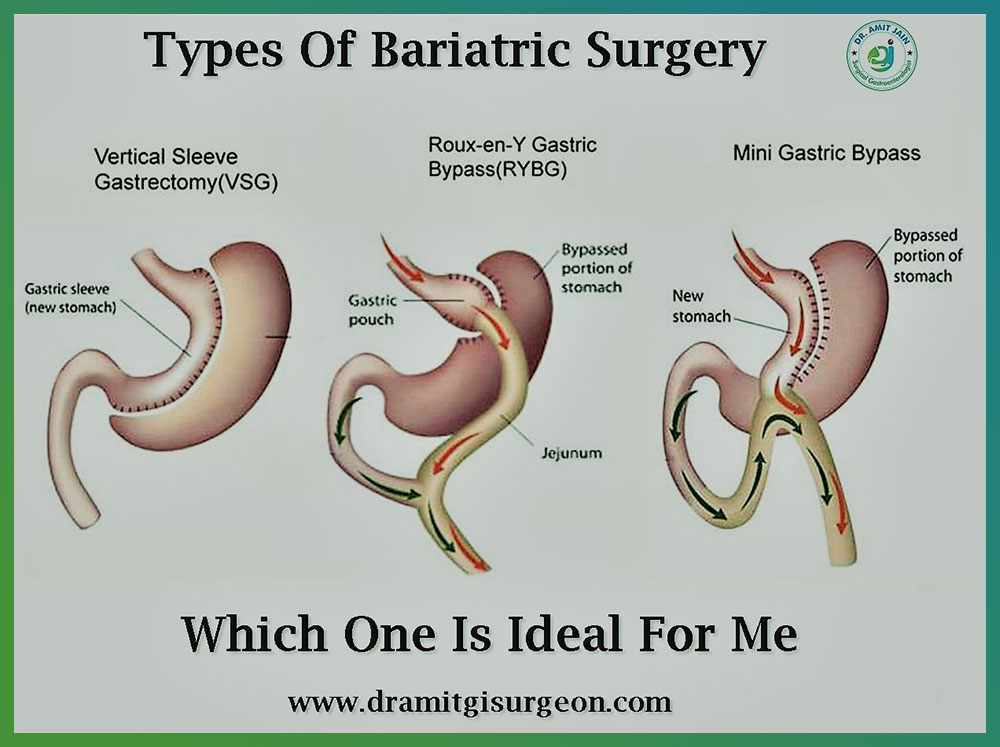
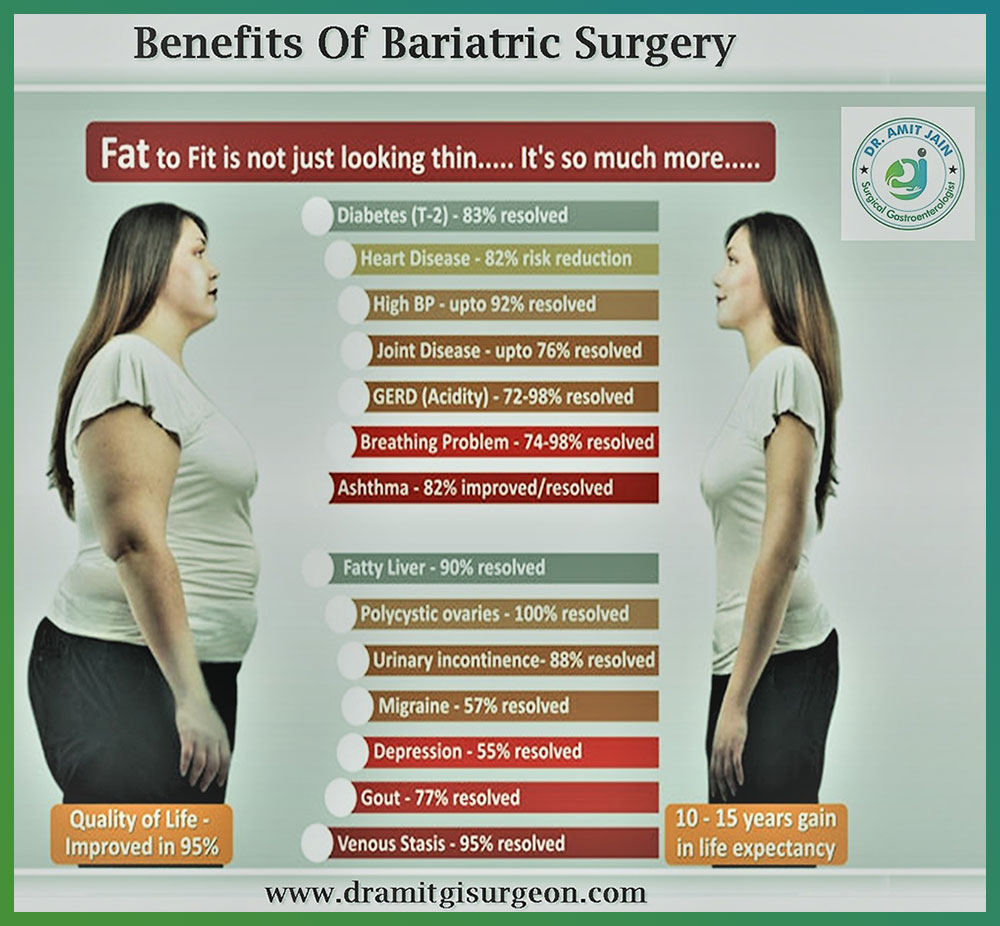
Advantages
Most of the people are able to reduce weight by diet & exercise, but it has been found that most of them recur weight within six month to a year. Persistent weight loss is what that differentiates Bariatric surgery from other means of weight loss
It has been studied and proved that weight loss alone does not improve most of the comorbidities associated with obesity. However bariatric surgery independent of weight loss improves most of these problems, so other then just weight loss there are so many hormonal changes in the body after surgery which result in improvement in these comorbid problems. It is the reason Bariatric surgery is also called as metabolic surgery, as it increases the overall metabolism
Cost of Bariatric Surgery
Bariatric surgery is advanced laparoscopic surgery which should be done in dedicated bariatric surgery centre. It is a team work which include experienced Bariatric surgeon, dedicated dietician , specialized anesthesia doctor, ICU care, pulmonologist and physiotherapist.
There are many factors which decide the cost of Bariatric surgery, the rate varies from one institute to other, patient comorbid conditions which may prolong the hospitalization and need for ICU care. It also vary according to room category and type of procedure done. The rate varies from Rs 2,00000 to 4,00000

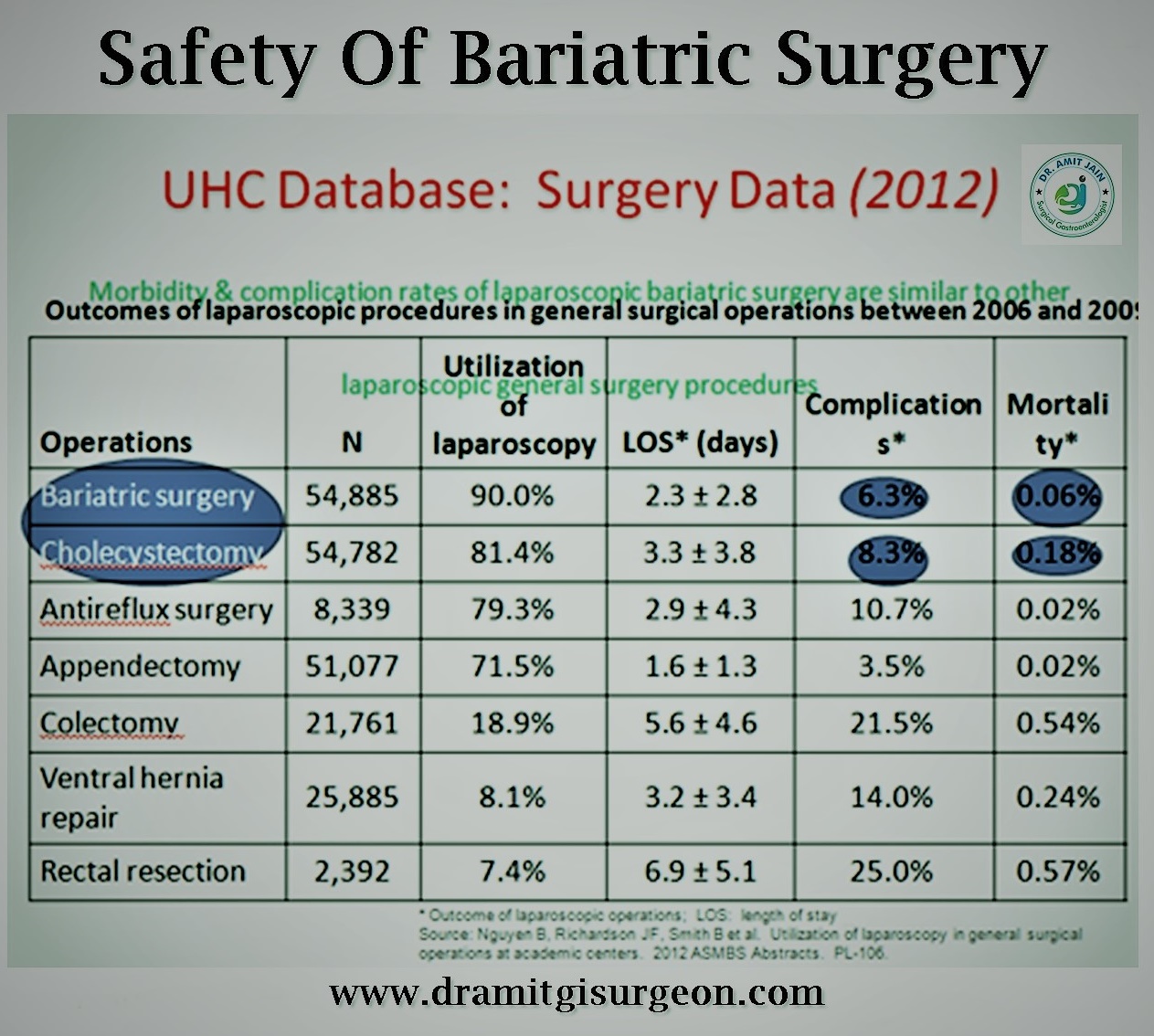
Safety Of Bariatric Surgery
The word surgery in itself causes a fear in the mind of patient, when it is absolutely indicated. So it is understood how difficult is to counsel an obese person for Bariatric Surgery. The main worrisome is the safety of the procedure. Now we have enough evidence in the literature which support the safety of the surgery. It is said that bariatric surgery is as safe as gallbladder surgery
Success Stories
